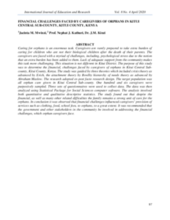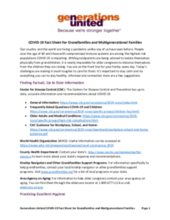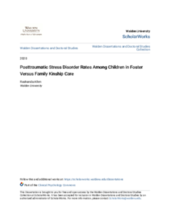Displaying 91 - 100 of 579
For this study, semi-structured interviews with twelve birth parents and twenty six permanent carers took place in New South Wales, Australia. Inductive thematic analysis was used to identify a pattern in the nature of adult relationships. The themes of 1) getting to know each other; 2) making family time; and 3) a shared future are presented.
There is little empirical evidence on how to improve the well‐being and safety of children in informal kinship care in Ghana. Thus, this study reports findings from in‐depth interviews with 15 young people, 18 to 23 years, from Banda—an ethnic group where informal kinship care is an accepted cultural practice.
This study examined the relation between neighborhood disorder and children’s internalizing and externalizing problems among children in kinship care and tested caregivers’ social support as a potential mediator.
This paper explores the experiences of Victorian foster and kinship carers accessing timely health assessment and ongoing healthcare for a child placed in their care; identifying barriers and enablers.
This paper explores the experiences of Victorian foster and kinship carers accessing timely health assessment and ongoing healthcare for a child placed in their care; identifying barriers and enablers.
The purpose of this study was to determine the financial challenges faced by caregivers of orphans in Kitui Central Subcounty, Kitui County, Kenya.
This factsheet from Generations United provides grandparents who are raising grandchildren with resources and information on how to stay healthy, informed and connected in light of the COVID-19 pandemic.
This study aims to explore how young migrants in kinship care in a Swedish suburb describe what different places mean to them and what these descriptions can tell us about their sense of belonging.
This chapter examines the cultural logic of child care in Africa, focusing on one variation of fosterage, okutekula, among the Ova-ambo in Northern Namibia.
The purpose of this study was to address the gap in the literature on the full spectrum of posttraumatic stress disorder (PTSD) attributes and symptoms for children living in nonkinship foster homes versus kinship foster homes, as well as examine the benefits and limitations of children placed in kinship and nonkinship foster homes.



